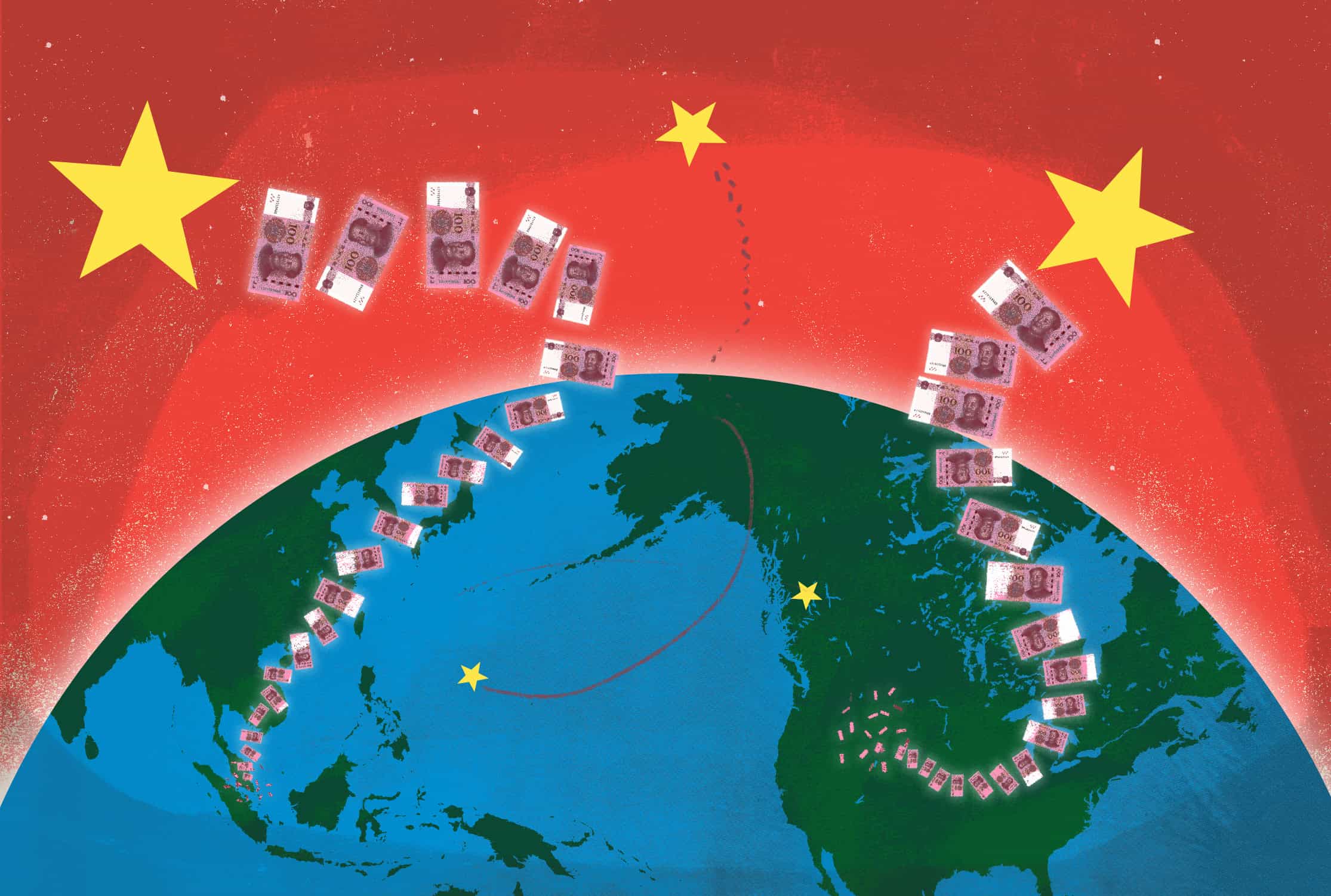
A despondent young white woman stands on a rooftop, clutching the paper that has diagnosed her with stomach cancer. A man in a suit approaches her, paying little heed to her sorrow. “Andrea is sick again,” he informs her.

They are husband and wife — but he married her solely to use her blood transfusions to save his true love, Andrea.
With tears in her eyes, the woman shrugs him off and refuses: “No! I can’t give my blood to her anymore.”
The dramatic scene unfolds in just 90 seconds — one of 80 episodes in the series “Mr. Williams! Madame is Dying” — and is an example of the kind of micro-series drama that is taking U.S. viewers by storm.
There’s a lot to say about the rise of mini soap operas in the U.S. — for instance, as commentary on the country’s ever shorter attention spans. But perhaps the most interesting aspect of this new trend is that the companies behind it are almost all Chinese-backed.
ReelShort has garnered the most attention: Last year, it was downloaded by 7 million Americans, and was even the most downloaded entertainment app at one point. Although it is based in California, Reelshort is 49.16 percent owned by the Beijing-based digital publisher COL Group, which is itself a portfolio company of Baidu and Tencent’s venture capital arms.
FlexTV, the short video app that released “Mr. Williams! Madame is Dying,” is not dissimilar: Originally owned by Anyue Network, a Guangzhou-based tech company, it was recently acquired by Mega Matrix, a New York Stock Exchange-listed company that is operated entirely by tech and investment executives with Chinese business backgrounds.
Both apps represent Chinese companies expressly courting a U.S. audience.
“To be honest, our team in China, they have a Chinese background, but they are doing this thing for American viewers,” Jia Songtao, chief strategy officer of FlexTV, said in March at an investment conference in New York. “In the future we are going to build a local team here.”
While the trend of Chinese-backed short video companies raises questions in the U.S. about influence campaigns and disinformation (see: ByteDance and TikTok), the companies also represent something much more simple: that despite the increased scrutiny and tensions, Chinese companies are looking abroad for their growth.
In China, the phenomenon is known as chu hai (出海), which translates to “go global” and encompasses everything from FlexTV and ReelShort to online shopping sites Temu and Shein, and even retailing giant Alibaba’s courier company Cainiao.
The Chinese business world, it seems, has decided that the best place to make money right now is outside of China.
“In the past two years, the number of our clients has increased at least 10 times, and many of them are in a hurry,” says Lina Peng, a senior analyst at EqualOcean, a consulting firm for Chinese companies going global. “These companies come from all walks of life — apparel, cosmetics, skincare and consumer electronics — and the entrepreneurs are relatively young and have attached great importance to ‘go global.’”
The sea change, says Vivi He, the chief executive of Shine Global, a Beijing-based consultancy for Chinese companies going overseas, has been abrupt. Although her company first started publishing research related to overseas expansion in 2020, “at that time, very few people paid attention to it.” Since 2022, she says, “‘go global’ started to explode, and now all industries are paying attention to it.”
Indeed, the data underscores the “go global” phenomenon. According to China’s Ministry of Commerce, the country’s industry-wide outward foreign direct investment (OFDI) totaled 954.17 billion RMB ($131 billion USD) from January to November 2023, an 8.2 percent year-on-year increase. Moreover, according to the Hong Kong Trade Development Council, 90 percent of the close to 800 Chinese enterprises surveyed last year indicated plans to “go global” in the next one to three years. A 2023 report by PwC also found that 67 percent of Chinese unicorn companies would maintain or add overseas expansion plans, significantly higher than the 41 percent reported in the 2020 survey.

Despite rising tensions and pushback to Chinese companies in the U.S., the impact of “going global” is nonetheless being felt — and not only by fans of “Mr. Williams! Madame is Dying.” In 2023, four of the top five most downloaded apps in the U.S. came from China. Meta’s annual report also revealed that advertising revenue from China contributed $13.49 billion, accounting for 10 percent of total revenue in 2023 and up from 6 percent previously. (Since Meta platforms, including Facebook and Instagram, are blocked in China, the increase reflects Chinese companies hoping to reach and sell to international audiences.)
The job search platform LinkedIn, which stopped operating in China last May, citing “slumping demand,” feels the trend as well. “In the past year, Chinese companies posted 270,000 overseas jobs,” Wang Xi, general manager of LinkedIn China, said in an interview last July with Chinese media outlet Caixin. “We expect that number to increase to 4.5 million by 2026.”
It’s not just the opportunities abroad that are encouraging Chinese companies to go global, of course. The economic slump at home is contributing as well.
On one hand, there’s a reduction in investment returns. On the other hand, the potential direct benefits of participating in science and technology research and development through asset-based factors have diminished.
Zongyuan Zoe Liu, a fellow at the Council on Foreign Relations
According to a report by the Chinese data platform IT Juzi, the number of Series A investments in China in 2023 was 1,695, a year-on-year decrease of 27 percent. Angel round investments and strategic investments also saw year-on-year decreases of 29 percent and 25 percent, respectively.
Zongyuan Zoe Liu, a fellow at the Council on Foreign Relations, notes that the depletion of investment capital in China has led to both tangible and intangible losses for the Chinese economy.
“On one hand, there’s a reduction in investment returns,” she says. “On the other hand, the potential direct benefits of participating in science and technology research and development through asset-based factors have diminished.”
Indeed, the issue has risen to national importance and represents a shift in priorities from Beijing’s strategy of “dual circulation.” In May 2020, China’s leader Xi Jinping introduced the bureaucratic term to signify that China should boost domestic demand while sustaining foreign markets as a dual approach to economic development. But at the time, Xi stressed that domestic demand and innovation should be the primary drivers of economic growth, with foreign markets and investors playing a secondary role.
Four years later, Long Yongtu, China’s former chief negotiator for the World Trade Organization (WTO) accession and former vice minister of foreign trade and economic cooperation, said that the prioritization has changed: “It is a prevailing trend for Chinese enterprises to go global,” he said in March.

Li Dongsheng, founder of a large electronics company TCL Technology, put a finer point on the predicament facing Chinese companies earlier this year. “Globalization of Chinese companies is now a question that must be answered,” he told a reporter from China’s state television. “Not going global means being left behind.”
GO OUT 2.0
If “go global” rings a bell, it’s because it is reminiscent of former Chinese leader Jiang Zemin’s initial push for Chinese companies to “go out” in the 1990s.
In that decade, China moved past the Tiananmen Square protests and initiated economic reforms. In July 1996, Jiang, fresh from a tour of six African countries, first mentioned “go out” during a visit to Tangshan, Hebei Province, which surrounds Beijing. He stressed that “go out” was targeted at state-owned enterprises and underscored the importance of using “all available foreign markets and resources.”
By 2002, during the 16th National Congress, Jiang advocated for enterprises of all ownership types to invest overseas, starting a trend of Chinese companies expanding globally and spurring rapid economic growth in China.
The circumstances that led Jiang to “go out” in the late 1990s are much the same as those animating “go global” — namely, China’s manufacturing overcapacity and its lack of domestic demand.

“The foundation for the sustained recovery and improvement of the Chinese economy after the epidemic is not yet solid, and there is insufficient effective demand, with overcapacity in some industries,” Premier Li Qiang, China’s second-highest leader, said during the Two Sessions in March.
Indeed, China’s manufacturing capacity utilization plummeted to 73.8 percent in the first quarter of this year. Excluding the first quarter of 2020, which was devastated by the COVID-19 pandemic, it was the weakest quarter since at least 2015. China’s total retail sales of consumer goods in 2023, meanwhile, increased by only 7.2 percent year-on-year; in recent years, this metric has been in the double digits.
Yet to industry observers, “go global” is not merely a recycling of “go out.” Although the two movements share similar triggering conditions, they have key differences.

For starters, in 2000, a survey by the Beijing Ministry of Commerce revealed that only 30 percent of Beijing companies considered “going out.” The vast majority simply didn’t need to since China’s vast market had not yet been fully explored.
Those who did “go out” also had to have a fair amount of courage and ambition. In 2000, for instance, Huawei held an internal ceremony to bid farewell to employees going to work overseas. A large red banner displayed a phrase that Chinese soldiers often hear before going to war: “Loyal bones buried everywhere in the green mountains, the world is our home.”
“Back then, going abroad was extremely difficult; it was like risking one’s life — a heroic feeling like the Long March,” Huang Yuanpu, the founder of EqualOcean, recently said in a podcast. “Now when I ask some companies, ‘Do you need great determination to go global?’ — they say, ‘No, because many people have returned from studying abroad in the United States and the United Kingdom.’”
A second key difference is that most Chinese companies in the first wave of go out focused on the downstream manufacturing industry — selling, for instance, clothing, home appliances and furniture. Now more Chinese companies are aiming to build their own brands.
We now try to present ourselves as an international company as much as possible and dare not mention our successful investment experiences in China, such as our investments in China’s chip industry…
A Beijing-based private equity firm manager
“They don’t just want to sell products; they want to become an American company, or an international company,” says Ivy Yang, founder of the New York-based consultancy Wavelet Strategy and a former communication executive at Alibaba. “They don’t want to just be the world’s factory. They want to be a brand with bargaining power.”
The company that owns FlexTV, for instance, markets itself as “dedicated to becoming a global streaming platform giant in the vertical screen entertainment era.” Shein, meanwhile, calls itself “a global fashion and lifestyle online retailer.” And CATL, the Chinese battery giant, describes itself as “a global leader of new energy innovative technologies, committed to providing premier solutions and services for new energy applications worldwide.”

Dawei Shi, chief partnership officer of IntelliPro, an international human resources company, says he sees three main reasons these companies are choosing to go global now. The gap between the U.S. and China in consumption habits and per capita income is still significant, of course. But the other two motivations are more optimistic. China’s e-commerce industry, he says, “is ahead of Europe and the United States; in many logistics and industrial chains, we have our own advantages.” And in certain technology areas, he adds, such as electric vehicles and solar panels, “China is very advanced, so technology leadership is a reason to go overseas.”
Whether foreign markets are willing to accept that technological leadership, however, remains to be seen.
GLOBAL GATEKEEPERS
China refers to electric vehicles, lithium batteries and solar panels as the “new three exports,” in contrast with the “old three exports” from decades ago: clothing, furniture and household appliances. But the Chinese government’s support for these three industries to ‘go global’ has sparked strong reactions from the global community.
On her April visit to China, U.S. Treasury Secretary Janet Yellen explicitly called out Chinese electric vehicles and solar panels and warned that “When the global market is flooded by artificially cheap Chinese products, the viability of American and other foreign firms is put into question.” A few days later, German Chancellor Olaf Scholz also visited China and, before meeting with Xi, publicly mentioned China’s “excess capacity” issue.
European Commission President Ursula von der Leyen announces the EV anti-subsidy investigation, September 13, 2023. Credit: European Commission
China has rejected these warnings as “an excuse for protectionism,” but the U.S. and Europe are making moves that could hinder Beijing’s hopes for going global.
The European Commission, for instance, is conducting an anti-subsidy investigation into Chinese electric cars to determine whether tariffs should be imposed to protect EU manufacturers. Tariffs of 27.5 percent already exist in the U.S. on Chinese electric vehicles, but there are calls to raise them even further.
The U.S., meanwhile, is not just rejecting Chinese products, but Chinese money as well — hurting China’s relatively young financial industry.
A Beijing-based private equity firm manager, speaking on condition of anonymity because she was concerned about retaliation, said she had been rejected multiple times when seeking investment projects in the U.S. because of her Chinese background.
“Some AI startups in the U.S., even those founded by Chinese nationals, are adamant about not accepting investments in Chinese currency,” she says. “We now try to present ourselves as an international company as much as possible and dare not mention our successful investment experiences in China, such as our investments in China’s chip industry, to the outside world.”
“In the past, Silicon Valley embraced investments from China,” says Rui Ma, chief operating officer of AlphaWatch.AI and founder of Tech Buzz China. “But now, no software industry will take Chinese funds, because there’s plenty of money in the U.S. and companies don’t need to take risks.”

Chinese companies that have already been successful overseas are also facing increasing pressure. The law banning Chinese ownership of TikTok is the most obvious example, but questions about forced labor are also threatening to hamper Temu and Shein. Last December, in a move that could largely affect Chinese retailers, Amazon slashed the commission rate paid to sellers of clothing items priced below $20 from 17 percent to 5 percent.
The global pushback means that “going global” may not be the economic salve Beijing needs it to be.
As Liu, at the Council on Foreign Relations, notes, “Emphasizing the ‘Go out’ policy only addresses the symptoms of the Chinese economy problem, rather than tackling the root causes. China faces long-standing structural issues, notably underconsumption.”
In early March, at the Two Sessions, Premier Li Qiang made a small gesture towards boosting consumption, announcing that the minimum monthly standard for China’s basic pensions would be raised by 20 RMB — less than $3. But a few days later, in an article in China Newsweek, which is published by the second largest state news agency in China, Zhang Jun, dean of the School of Economics at Fudan University in Shanghai, wrote that Beijing needs to double the basic pensions for more than 60 million rural elderly families. Increasing support for household income “as soon as possible this year,” he argued, was needed in order to promote domestic consumption.
In the absence of more drastic government initiatives to boost consumer spending, ‘going global’ still holds the most promise for China’s entrepreneurs and business people — especially for those industries and businesses that slide under governments’ radar. And the impact will likely be felt far and wide for the foreseeable future.

Fang Daqing, for instance, owns 29 barbecue chain restaurants in eight cities across China. He had never dreamed of international expansion, but the chaos of the Shanghai lockdowns in April, 2022, forced him to consider the option. “We didn’t want to just sit around,” he told me.
By the end of the month, Fang had established contact with a developer in Singapore; by the end of May, he had remotely signed a restaurant lease; on July 14, the restaurant began renovations; and on August 27, his 30th barbecue restaurant officially opened for business in Singapore.
Compared to China, net profits at his restaurant in Singapore are lower because costs (for rent, wages and electricity) are higher. But Fang says the expansion has done well — even as his domestic empire flounders.
At the end of 2022, when China finally lifted its pandemic control policies, Fang assumed his restaurants would bounce back. But last year, sales at his restaurants in China dropped by more than 10 percent, the first time a drop that size had happened in the 12 years since he opened.
He knew something was really wrong last International Labor Day, a five-day break in May that usually drives significant consumption.
Nowadays, the competition in China is too fierce. Everyone wants to grab the market first, even if it means losing money. My business can’t be done here.
Zhong Liwen, owner of a freight company
“The performance of the last two days of last year’s May Day holiday was not like a holiday at all,” Fang says. “The decline was particularly severe. This was the case for the entire restaurant industry that I know.”
Fang decided to open a second barbecue restaurant in Singapore last year and set his sights on a location. To his surprise, another Chinese entrepreneur paid a whopping 43 percent more than his offer.

Zhong Liwen, who owns a freight company, says the same phenomenon is happening in the Middle East.
A few years ago, Zhong had never considered going global. He was born and raised in the bustling city of Taizhou, Zhejiang Province, and his family did business locally. During the pandemic, busy international freight shipments earned him a good amount of money, with his orders increasing by 80 percent in 2023.

But as capital has become tighter recently, Zhong says his clients — Taizhou companies who use him to ship goods such as refrigerators, cars and solar panels to the U.S. and Europe — are moving to a new land: Saudi Arabia. Chinese factories, he says, are choosing to relocate in order to be closer to markets with higher levels of consumption and to make exporting their goods easier.
“Every noodle shop you walk into, it’s all Chinese,” Zhong says of his experience visiting Saudi Arabia last year. “When you see people getting off the bus on the street, they’re also all Chinese entrepreneurs, coming in groups to visit the commercial areas there.”
This year, Zhong rented a warehouse in Saudi Arabia, and in the future, he plans to buy his own warehouse there.
“It’s very difficult to do business in China now; the domestic environment is not good,” he says. “Nowadays, the competition in China is too fierce. Everyone wants to grab the market first, even if it means losing money. My business can’t be done here.”

Yi Liu is a New York-based staff writer at The Wire. She previously worked at The New York Times and Beijing News. Her work has also appeared in China Project, ChinaFile and Initium Media.





